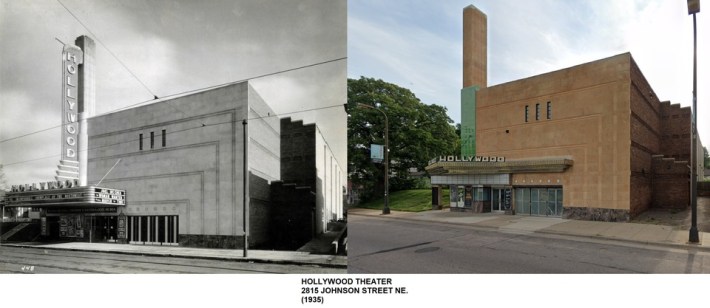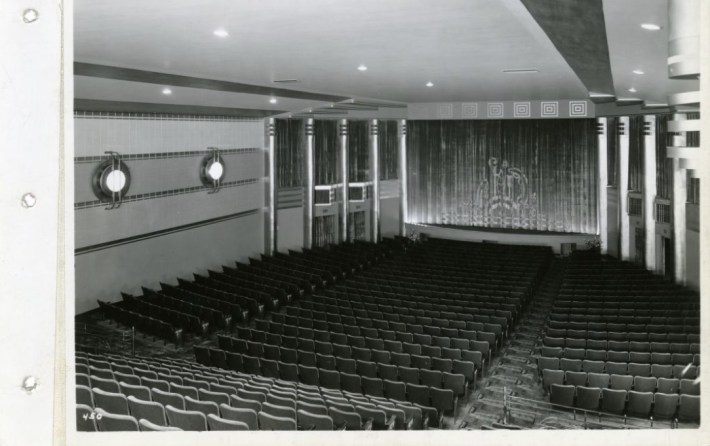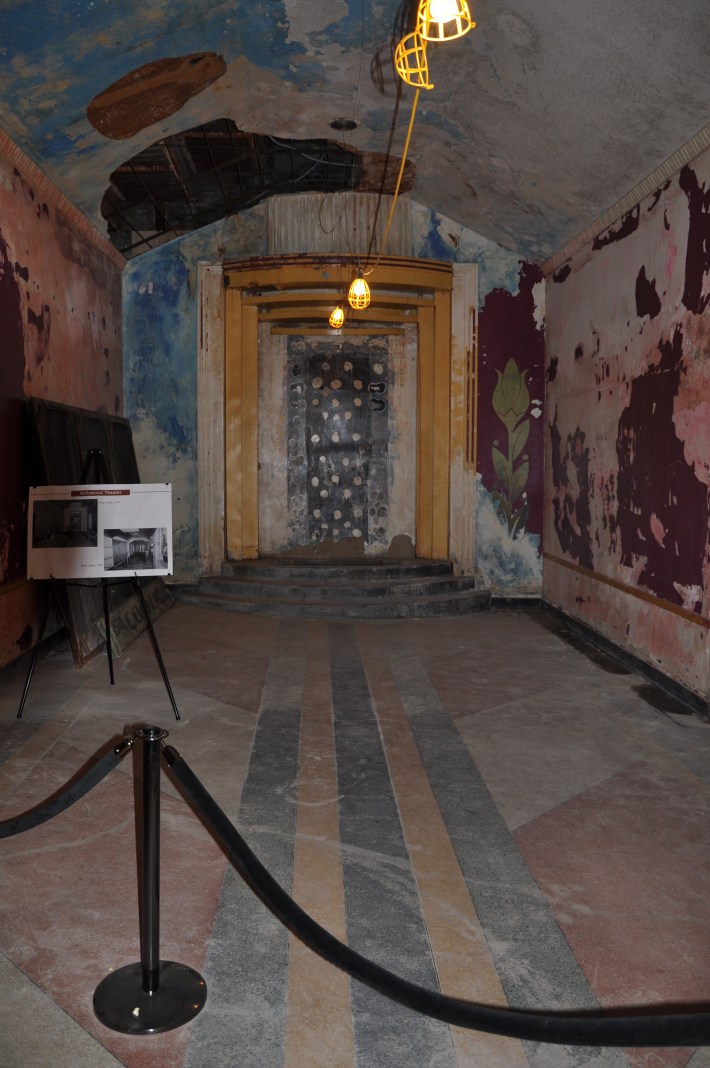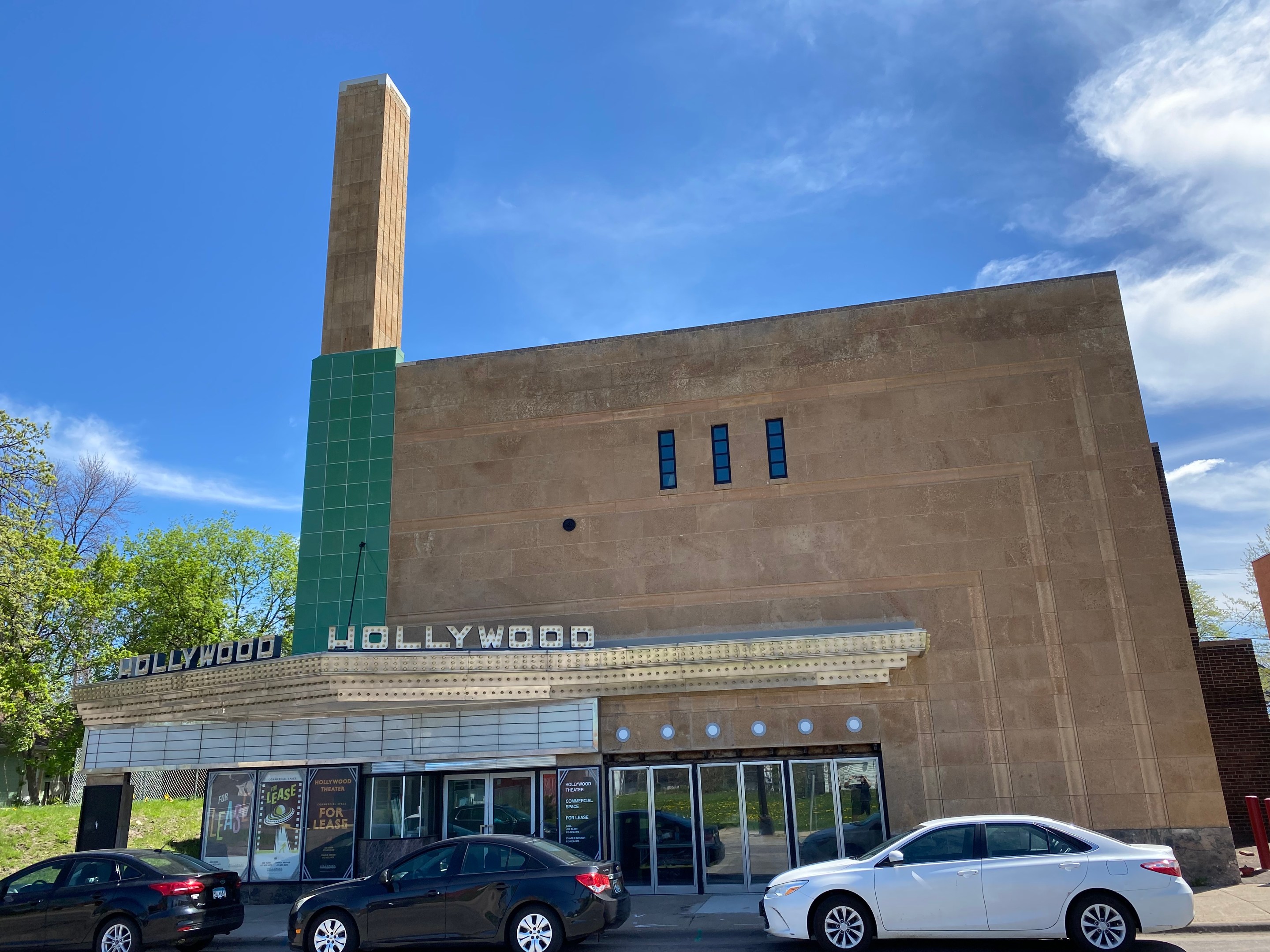The Hollywood Theater, an art deco movie house gem in northeast Minneapolis, operated for 52 years—from 1935 to 1987. It has sat vacant at 2815 Johnson St. for 35 years now, rotting away as a slow-marching parade of developers projected ill-fated rehabilitation dreams onto its Kasota limestone façade and terrazzo tile lobby.
Until, finally, Andrew Volna agreed to purchase the decaying landmark from the city for $1 in 2015. "A dollar was too much," he quips, audibly fatigued by the seven-year journey to restore the "decaying eyesore." The finish line is in sight: Volna expects the 300-capacity Hollywood to reopen by late summer.
“It’s not going to be a movie theater—we’re going to operate as an event center," he says. "I don’t even know where to begin with the story…”

Volna grew up blocks from the theater, and says the Hollywood was “kind of a dump” even when he was a moviegoing kid. He understands many in the neighborhood would like to see it restored to its past glory, similar to the Parkway Theater at 48th and Chicago, but “the economics just aren’t there.”
“It’s a cool space available for weddings, comic book shows, photo shoots, wherever you need a lot of people to assemble... hopefully it'll be a source of pride for the neighborhood," he says of the 10,000-square-foot building, which earned National Register of Historic Places designation in 2014 as a prime example of Streamline Moderne design.
Renowned architects Jack Liebenberg and Seeman Kaplan built the Hollywood Theater for $100,000—or $2.1 million in today's dollars. Touting "a number of features not heretofore utilized in this area," the 1,000-capacity movie theater arrived to much fanfare in October 1935, the Minneapolis Tribune reported. "The Incomparable Showplace of the Northwest," as ownership billed it, premiered with screenings of the James Cagney comedy The Irish In Us. It even boasted an on-site daycare so crying babies couldn't ruin Citizen Kane, Casablanca, and Little Lord Fauntleroy, among other films of Hollywood's Golden Age.

As VCRs and megaplexes rose throughout the '80s, the death of single-screen neighborhood movie theaters across the country accelerated. Bev Johnson, who owned the Hollywood during its final few years, admitted the bathrooms were "the pits." She still hoped the community would rally to save the theater.
"The audiences didn't come," Johnson told the Star Tribune in 1988. "It's sort of funny, we opened with Risky Business and we closed with No Way Out."
(“I remember the last movie I saw there was Blue Velvet,” says Volna, voice popping with movie-buff nostalgia.)
Dreams of redeveloping the Hollywood Theater date back to 1989, when a real estate group hoped to convert it to apartments before hitting too many historic preservation hurdles. Around that time the city considered razing the Hollywood, though it would end up purchasing the theater in 1993 for $20,000, the Minneapolis Community Development Agency (MCDA) told the Star Tribune.
The city began shopping the Hollywood to developers the following year, at first to a nonprofit preservation group that hoped to restore the single-screen movie house for $1 million. Around 2000 it seemed developer Ed Finley's dream of reimagining the theater with a "vaudeville nouveau" format gained traction, the Star Tribune reported, before ultimately sputtering out; Finley claimed he could've accomplished the rehab "on the cheap" for just $950,597. Eventually, in 2003, the MCDA granted development rights to Awsumb & Associates, but its $2 million plan for a restored lobby/attached housing fell through as well.

In 2014, Volna told the Strib that his initial plan for the Hollywood—office space—would cost between $1 and $2 million. So far, he says, that cost has ballooned to around $4.5 million.
“When I say it was a shithole, I mean it was bad. Really bad,” Volna says, citing a failing roof, flooded basement, and rat infestation. Neat finds like buffalo nickels and ancient gum wads were discovered beneath the seats, and hidden graffiti from the 1935 construction team was unearthed. The projector booth was preserved as a time capsule from middle-century cinema. Volna, who has a history degree, hired an architectural photographer to document everything.
Needing approval from the National Parks Service for any changes to the building was “a tortuous process" that "moved at a glacial pace,” says Volna, who also owns CD/DVD/vinyl manufacturing company Noiseland Industries. A fight over adding windows led to his decision to become owner/operator of an event space, resulting in a constellation of bureaucratic factors that, somehow, green-lit the window request.
Most of the seats have been cleared out, and mezzanine levels have been added. "It will be an exceptional place," Volna says. His 91-year-old father can’t remember a time when the lobby fountain functioned, though Volna is in talks with a fountain guy to make sure it’s flowing by re-opening day.
There'll absolutely be an open-house party for the neighborhood to see the transformation, share old memories, and to inform Volna "what I did wrong."
"My kids are 14 and 10, and they just think that's what I do: working endlessly on this brutal project, because I've been working on it since they've been sentient... It wasn’t my desire to spend this much of my life working on the Hollywood Theater,” Volna says with an exhausted chuckle. “It didn’t sit empty for 30 years because it was low-hanging fruit.”






